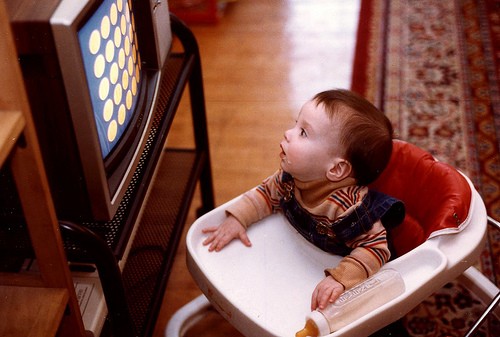Tips for parents
Children are starting to watch TV earlier in life than in past. Television is often used as a babysitter or children are allowed to have tv in their bedrooms, thus parents loose control what and how much television is watched and don't spend enough time with chidren.
What can parents do to prevent these harmful effects of TV?
Turn off the TV and encourage play! The first two years of your child's life represents a critical window for neurological development. Children should not be allowed to watch TV at all during that time. Instead, they should play with age appropriate toys that will help them develop manual dexterity and imagination.
After 2 years of age, children should watch no more than 1-2 hours of TV. The American Academy of Pediatrics states that consistent TV watching of more than 1-2 hours a day can cause sleep behavior and attention problems, thus the experts recommend putting a limit of on children's TV viewing time.
Studies show that it is easier to decrease sedentary behaviors than it is to increase physical activity. Once parents put a limit on TVtime, children will be more active. However, parents need to be a little more proactive to increase their children's physical activity by scheduling playtime involving physical exertion.

Parents should select the programs they would like their children to watch, watch them together as a family, and use them as a starting point for discussions.The American Academy of Pediatrics recommends the following to help your child develop positive viewing habits:
1. Set limits. Limit your children's use of TV, movies, and video and computer games to no more than 1 or 2 hours per day. Do not let your children watch TV while doing homework. Do not put a TV in your child's bedroom.
2. Plan what to watch. Instead of flipping through channels, use a program guide and the TV ratings to help you and your children choose which shows to watch. Turn the TV on to watch the program and turn it off when it is over. Or use a DVR like TiVo to record only the shows your child is allowed to watch. You can skip through the commercials, too!
3. Watch TV with your children. Whenever possible, watch TV with your children and talk about what they see. If your children are very young, they may not be able to tell the difference between a show, a commercial, a cartoon, or real life. Be especially careful of "reality-based" programs. Most of these shows are not appropriate for children.
4. Find the right message. Some TV programs show people as stereotypes. If you see this, talk with your children about the real-life roles of women, the elderly, and people of other races.
5. Help your children resist commercials. When your children ask for things they see on TV, explain that the purpose of commercials is to make people want things they may not need.
6. Look for quality children's videos and DVDs. There are many quality videos and DVDs available for children. Check reviews before buying or renting programs or movies.
7. Give other options. Watching TV can become a habit for your children. Help them find other things to do like playing, reading, learning a hobby, a sport, an instrument, or an art, or spending time with family, friends, or neighbors.
8. Set a good example. As a role model, limiting your own TV viewing and choosing programs carefully will help your children do the same.
9. Express your views. When you like or do not like something you see on TV, make yourself heard. Stations, networks, and sponsors pay attention to letters from the public. If you think a commercial is misleading or inappropriately targeting children, write down the product name, channel, and time you saw the commercial and describe your concerns.